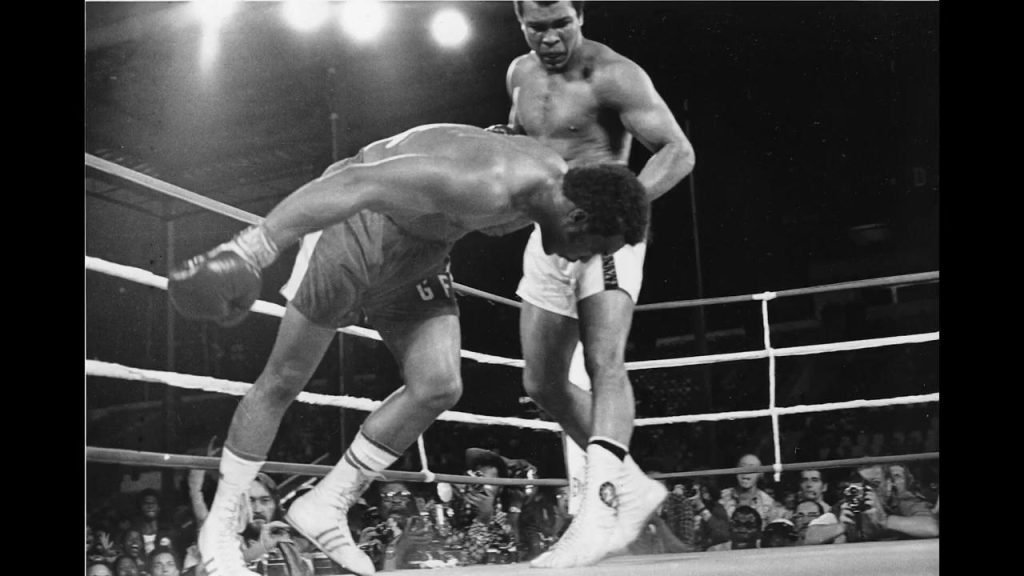Remembering the Rumble: Muhammad Ali’s Historic Victory Fifty Years Later
3 min read
FILE: Muhammad Ali’s ‘Rumble in the Jungle’ fifty years on

FILE: Muhammad Ali’s ‘Rumble in the Jungle’ fifty years on
Fifty years ago, Muhammad Ali made sports history when he reclaimed the heavyweight boxing title in the legendary bout known as the “Rumble in the Jungle.” On October 30, 1974, in Kinshasa, Zaire (now the Democratic Republic of the Congo), Ali faced off against George Foreman in a match that would define his legacy and reshape the landscape of boxing.
Foreman entered the fight as the overwhelming favorite, boasting an impressive record and formidable knockout power. However, in a stunning upset, Ali knocked Foreman out in the eighth round of their 15-round contest, proving once again that he was not only a remarkable athlete but also a master strategist.
Ali’s journey to this moment was anything but straightforward. Stripped of his heavyweight title in 1967 for refusing to be drafted into the Vietnam War, Ali’s defiance made him a symbol of resistance and integrity. His refusal stemmed from deeply held religious beliefs, and he labeled himself a conscientious objector. The repercussions of his stance were severe; he faced a five-year prison sentence for draft evasion. However, he remained free while appealing the conviction, which was ultimately overturned by the Supreme Court in 1971.
Returning to boxing, Ali faced Joe Frazier in what was dubbed “The Fight of the Century” in March 1971, but lost that match by unanimous decision. Undeterred, he soon set his sights on reclaiming his title. After defeating Frazier in a rematch and watching Foreman capture the heavyweight championship, Ali was ready for the challenge of facing Foreman in Zaire.
The Rumble in the Jungle was not just a fight; it was a cultural event that attracted worldwide attention. Ali famously declared, “I said last night, I had a dream, when I got to Africa I had one hell of a rumble.” His braggadocio and charisma were on full display as he recounted his “fights” with alligators and lightning, showcasing his unique ability to blend sports with performance art.
In the ring, Ali employed a strategy he later termed “rope-a-dope,” allowing Foreman to throw powerful punches while leaning against the ropes. As the fight progressed, Foreman, who was unable to sustain his strength in the sweltering heat, began to tire. Ali seized this opportunity and delivered a powerful combination that knocked Foreman down, leading to a stunning victory.
With this win, Ali not only regained his heavyweight crown but also solidified his status as one of the greatest boxers of all time. Following this victory, he went on to have memorable bouts, including the “Thrilla in Manila,” where he defeated Frazier once more. Ali’s boxing career was marked by his extraordinary skill and resilience, culminating in a record of 61 fights, 56 wins (37 by knockout), and five losses.
However, Ali’s life after boxing was a challenging one. Shortly after retiring, he was diagnosed with Parkinson’s Disease, a condition that would significantly impact his health in the years to come. Despite this struggle, Ali remained active in public life, using his platform to advocate for various humanitarian causes.
Known as the “Louisville Lip” for his brash personality and eloquent speech, Ali embraced the moniker “The Greatest,” a title that resonated not only within the realm of sports but also in the broader context of American culture and social justice. He became a global icon, admired for his athletic prowess as well as his courage to stand up for his beliefs.
Muhammad Ali passed away on June 3, 2016, leaving behind a legacy that transcends boxing. As we reflect on the 50th anniversary of the Rumble in the Jungle, we remember not just the victory itself but the man who embodied the spirit of determination and defiance. Ali’s story continues to inspire countless individuals around the world, reminding us of the power of belief, resilience, and the pursuit of greatness.